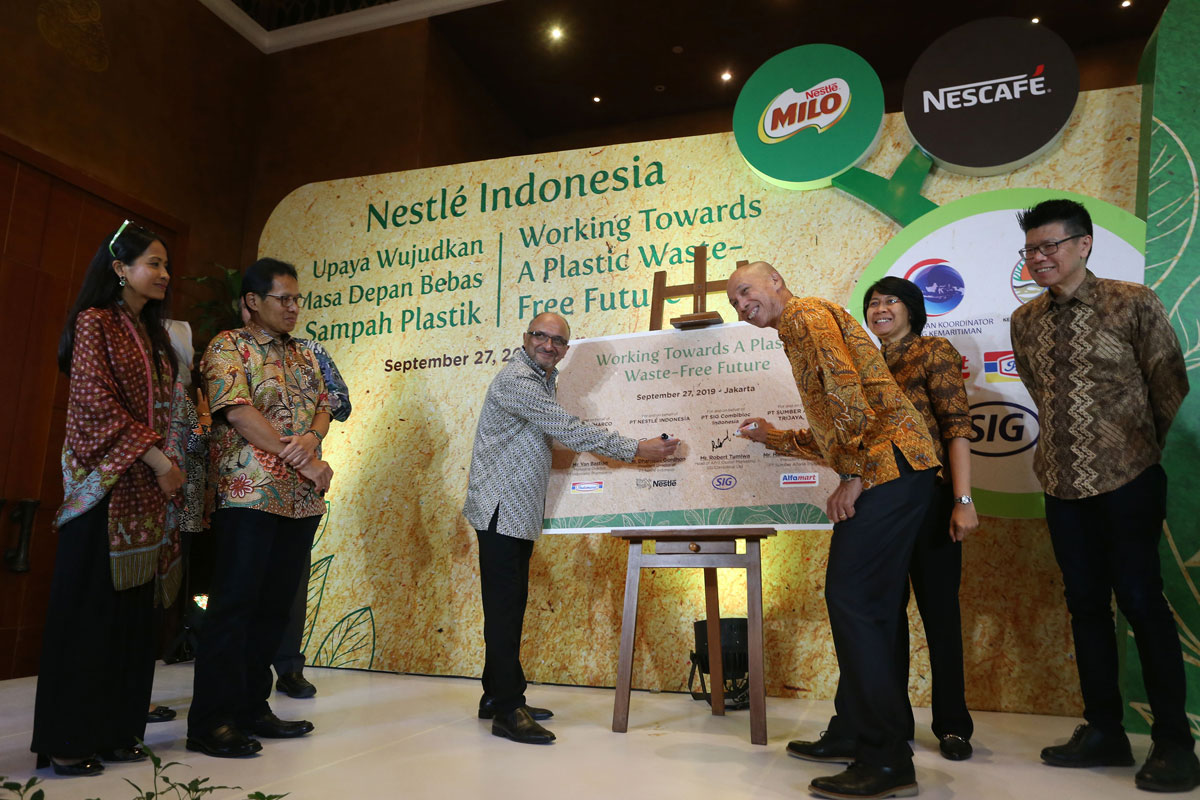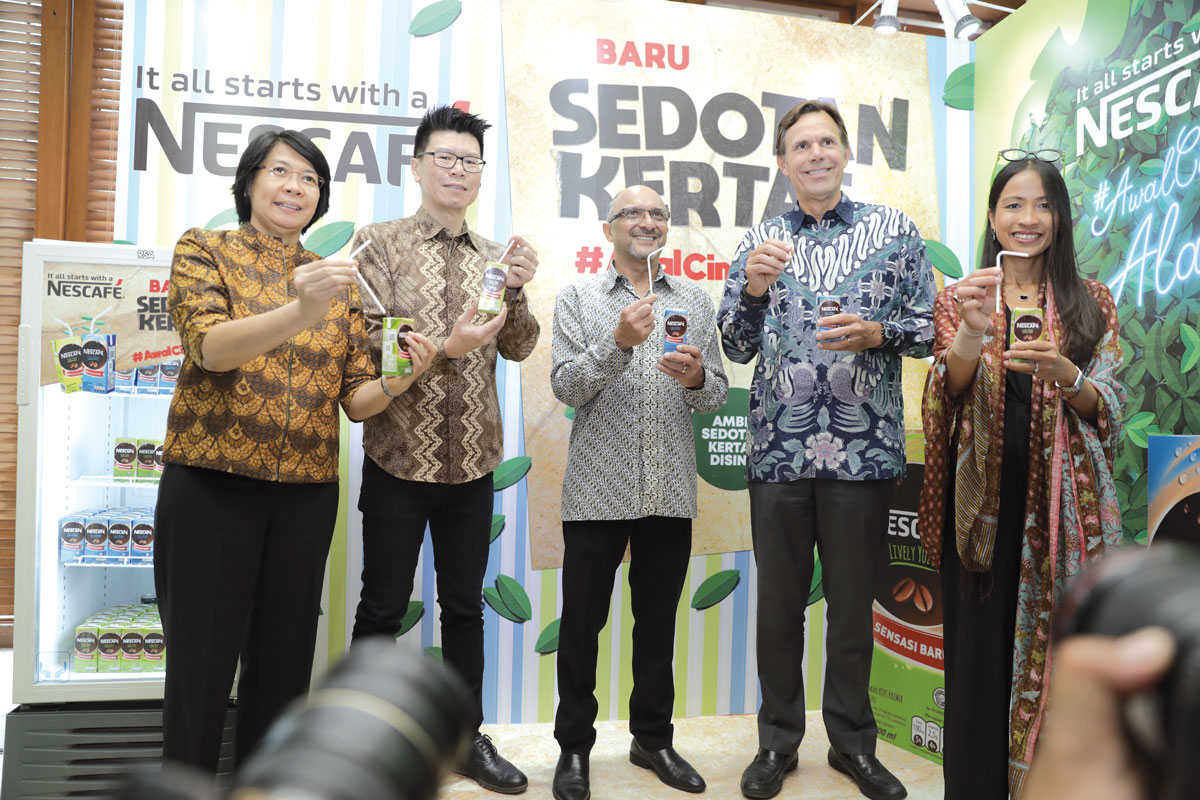Popular Reads
Top Results
Can't find what you're looking for?
View all search resultsPopular Reads
Top Results
Can't find what you're looking for?
View all search resultsNestlé launches paper straws, cups to curb plastic use
Nestlé Indonesia, a unit of the world’s largest food and beverage company Nestlé, will be rolling out the paper straws on the Nescafé packaged drinks — for its two modern-day variants, the Lively Yuzu and Cool Coconut — throughout October to December this year.
Change text size
Gift Premium Articles
to Anyone
I
n an effort to reduce plastic waste and raise awareness on plastic pollution, Nestlé Indonesia has just launched a breakthrough in packaging innovation by introducing paper straws for Nescafé ready-to-drink products and paper cups for cold MILO drinks served at sports events sponsored by the brand.
Nestlé Indonesia, a unit of the world’s largest food and beverage company Nestlé, will be rolling out the paper straws on the Nescafé packaged drinks — for its two modern-day variants, the Lively Yuzu and Cool Coconut — throughout October to December this year. For this groundbreaking move, Nestlé will be the first food and beverage company in the country to use paper straws for packaged drinks on a massive scale. This initiative, which replaces the plastic straws with paper ones, is in line with the government’s target to reduce plastic waste by 70 percent by 2025.
The new Nescafé packaged drinks with paper straws will be available at convenience stores Alfamart and Indomaret across Greater Jakarta.
“We’re planning to roll out this packaging solution for other ready-to-drink products in phases progressively with the ultimate objective of eliminating 450 million plastic straws by the full roll-out,” says Dharnesh Gordhon, the president director of Nestlé Indonesia.
Nestlé, on the other hand, has committed to making all of its packaging 100 percent recyclable or reusable by 2025.
“We know that this initiative [alone] is not enough, and we need to do much more to solve the plastic challenge,” says Chris Johnson, the executive vice president of Nestlé S.A. in charge of Zone Asia, Oceania and sub-Saharan Africa (AOA).
Dharnesh Gordhon (third left), president director of Nestlé Indonesia, and Chris Johnson (fourth left), executive vice president of Nestlé S.A. in charge of Zone Asia, Oceania and sub-Saharan Africa (AOA) unveil the latest move by Nestlé to curb plastic use (Photo Courtesy of Nestle Indonesia/.)In creating a more sustainable and circular system, Nestlé focuses on three core areas of work: developing modern packaging, shaping a waste-free future and encouraging sustainable behaviors. The company also seeks to build awareness, inspire people to take action and champion innovations by leading the green initiatives, Johnson adds.
Nestlé Indonesia, furthermore, aims to increase the recycling rates by collaborating with several business partners. The company has teamed up with convenience stores Alfamart and Indomaret to build a waste collection system, aiming to place a total of 50 recycling drop boxes -- each franchise chain will get 25 boxes.
The company, moreover, has partnered up with its packaging supplier SIG Combibloc Indonesia to recycle its packaging, such as the aluminum foil and paperboard in beverage cartons. SIG Combibloc Indonesia will also collect and pick up the packaging from the drop boxes before recycling them into metal roofing sheets, boards or notebooks.
“We know we cannot change the system alone. It requires collaboration and innovation on a global scale,” says Welih Sutidjan, the business executive officer for ready-to-drink business at Nestlé Indonesia.
Seeking to create lasting and impactful changes, Welih adds, Nestlé Indonesia has pledged to collaborate with relevant stakeholders, including scientists, packaging specialists, community groups and the government.
Chocolate beverage brand MILO plans to launch an initiative to use 100 percent recyclable paper cups to serve cold MILO drinks at its sports events. This initiative will be rolled out gradually starting from January next year.
“[We seek] to inspire Indonesian families to adopt an active and healthy lifestyle through our sports activities,” says Prawitya Soemadijo, the business executive officer of the beverages business unit at Nestlé Indonesia. “Furthermore, we’re also committed to raising environmental awareness by launching the initiative on recyclable paper cups.”
During a running event in July titled “MILO Jakarta International 10K”, for instance, Nestlé Indonesia provided public education on sorting waste to the runners. And through its programs called Nestlé for Healthier Kids, the company also gives education on proper waste management to over 30,000 students in 171 secondary schools across Indonesia.
Both Nescafé and MILO have started a social media movement with the hashtag #AwalCintaiAlam in a bid to engage the younger generation to participate in the green lifestyle and reduce their plastic straw consumption.
Waste management to conserve the environment is not a new thing for Nestlé Indonesia, which has teamed up with local players to tackle the waste challenge in Indonesia. In Ngantang, East Java, the company seeks to conserve clean water, improve the public sanitation system and improve the waste disposal system.
Nestlé Indonesia is also the steering committee of the National Action on Plastic Partnership (NPAP), launched in March by Coordinating Maritime Affairs Minister Luhut Binsar Pandjaitan. The partnership aims to change the current “take-make-waste” economic model into a circular economy to address plastic pollution in Indonesia.











